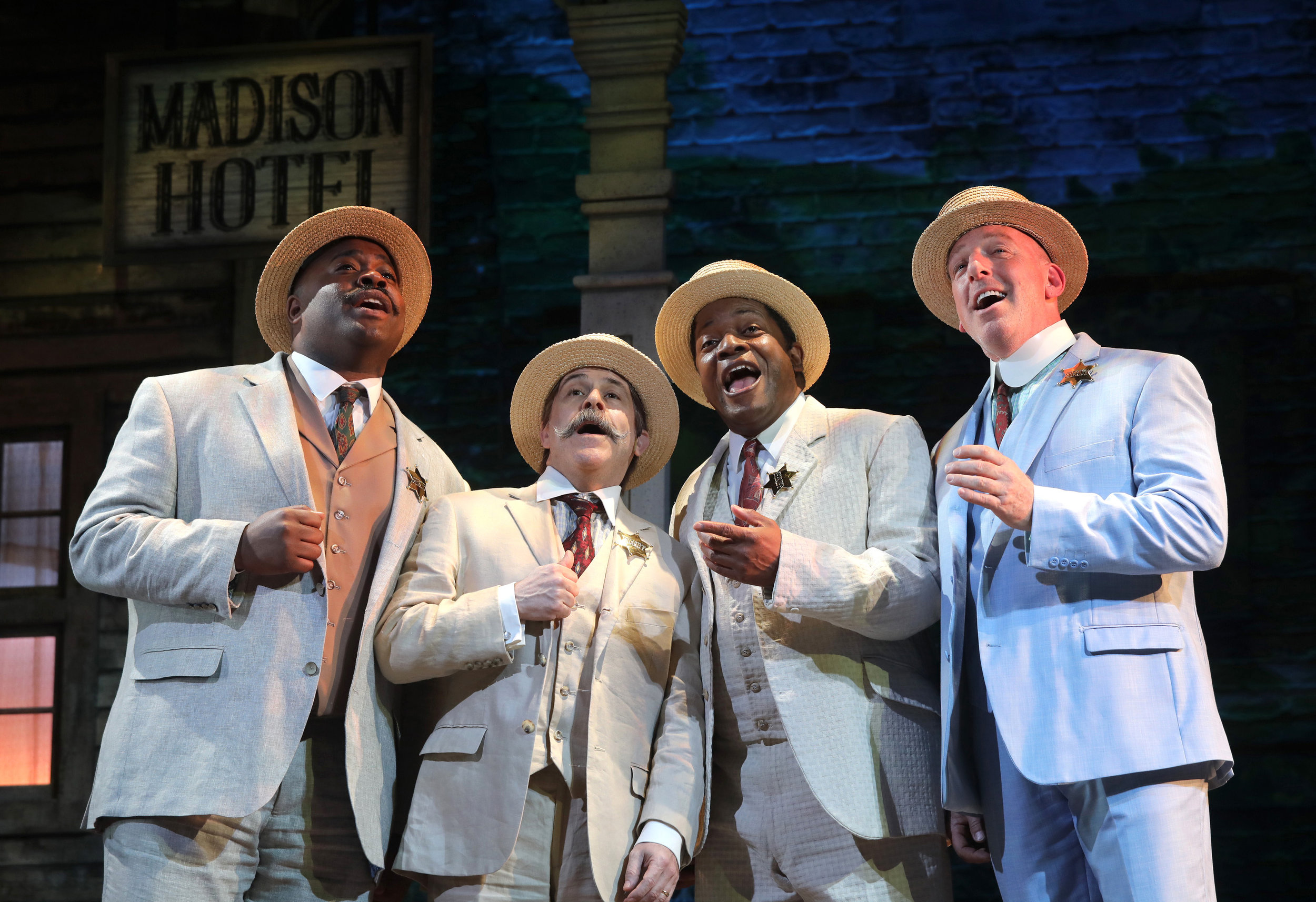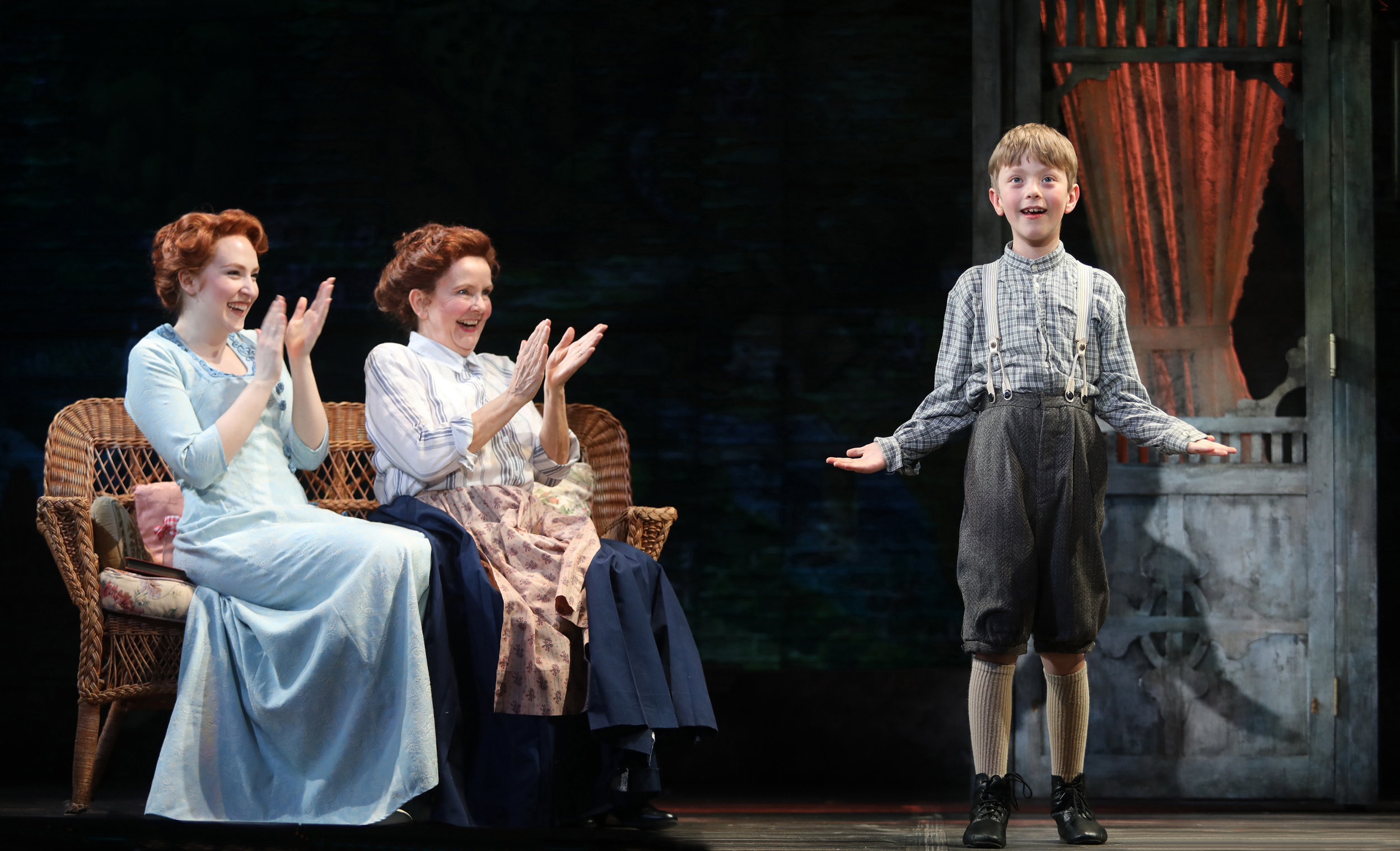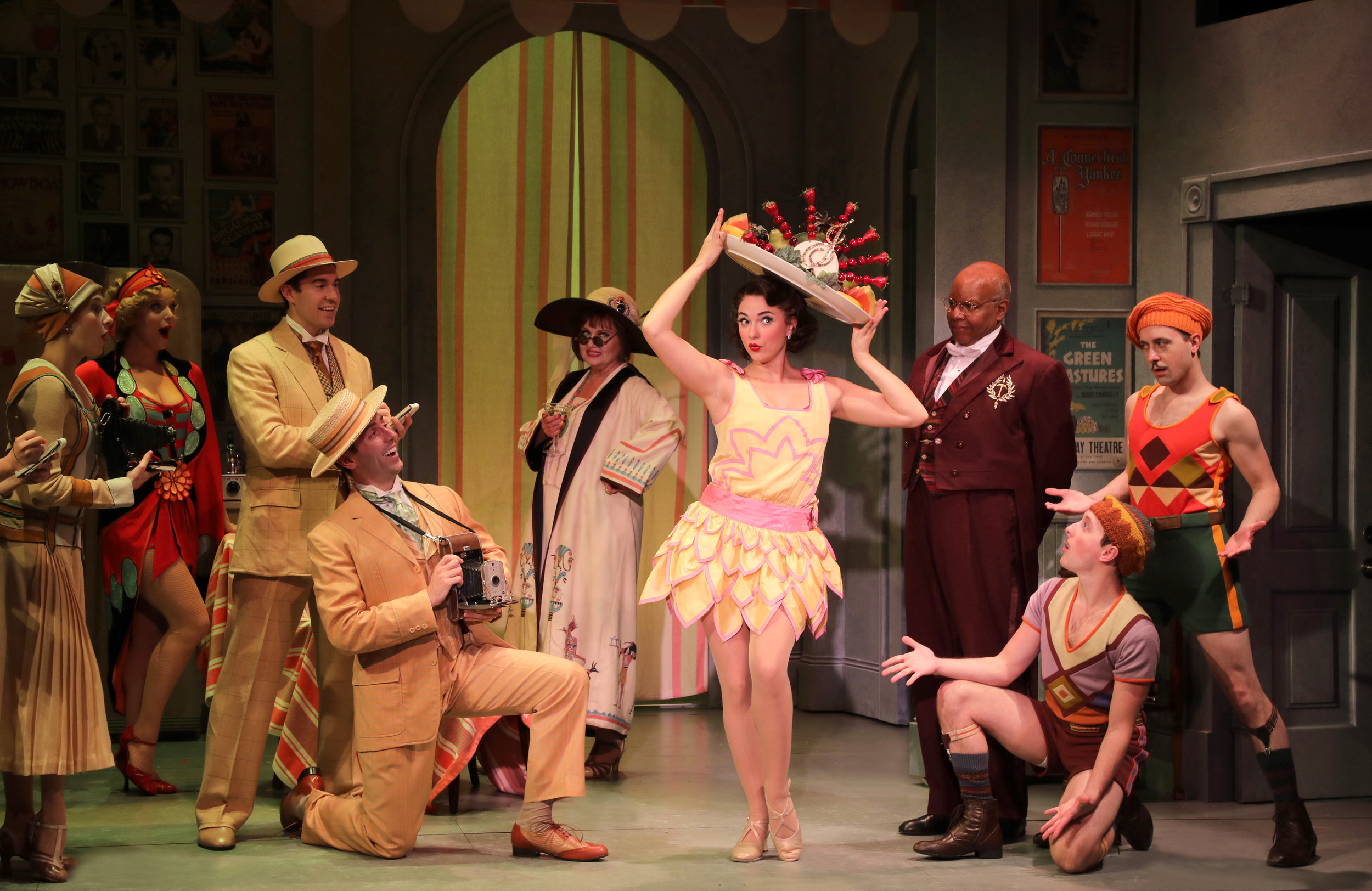Review of Billy Elliot, Goodspeed Musicals
The London original of the long-running success Billy Elliot, the Musical closed in 2016, having opened 11 years previous. The show clearly has audience appeal, based largely on the prospect of seeing youngsters dance in a variety of styles, including ballet and tap and boogie. It’s a show that celebrates the urge to self-expression that can lead to a life chasing the footlights, reminding audiences how uplifting—even to onlookers—the discovery of talent can be.
The film directed by Stephen Daldrey, from Lee Hall’s script, from which the musical derives, arrived in 2000 and looked back at the hard-fought and losing struggle by the UK’s National Union of Miners to prevent mine-closings in their doomed industry by staging a massive strike in 1985-86. The effort, which occasioned considerable sacrifice and conflict among the miners, was defeated by Prime Minister Margaret Thatcher in what became an important victory in the ongoing privatization that dismantled the so-called Welfare State. Billy Elliot, The Musical gives Sir Elton John, Music, the opportunity to fashion a working-class-hero vehicle with Lee Hall’s Book and Lyrics. Certainly one of the effects of the musical is that it’s given thousands of child actors opportunity to take to the stage in dance roles that are both demanding and rewarding.
Billy Elliot (Liam Vincent Hutt) with the cast of Goodspeed Musicals’ Billy Elliot The Musical, now playing at The Goodspeed through November 24. Photo by Diane Sobolewski.
At Goodspeed in East Haddam, directed by Gabriel Barre, with choreography by Marc Kimmelman and musical direction by Michael O’Flaherty, Billy Elliot, the Musical makes the most of its talented young cast, and the many opportunities for the adult cast to move in the aisles, sometimes as riot police opposing strikers, give the show a rowdy energy. Which helps because the songs don’t exactly stick in one’s mind and the show’s dramatic arc feels like something you’ve already seen, even if you missed the Oscar-nominated film. And yet there are pleasures to be found.
Mrs. Wilkinson (Michelle Aravena), Billy Elliot (Liam Vincent Hutt) with the cast of Goodspeed Musicals’ Billy Elliot The Musical. Photo by Diane Sobolewski
A young lad in a mining family minus recently deceased Mum, Billy (Liam Vincent Hutt or Taven Blanke), discovers a talent for ballet he didn’t know he had, encouraged by Mrs. Wilkinson (Michelle Aravena), a wonderfully committed teacher who sees in him a vicarious satisfaction of her own defeated dreams; working-class family struggling (even more than usual because they’re on strike) is not sympathetic to the boy’s means of self-expression, or probably artistic expression in general (Billy takes up dance lessons when he’s supposed to be going to boxing lessons). The subtext is that any boy who wants to dance rather than box must be gay—greatly not ok with this lot. But he’s not—ostensibly. Billy does have a friend, Michael (Jon Martens), complete with Elton John glasses, who fancies him, as does Mrs. Wilkinson’s daughter, Debbie (Erica Parks). Eventually there’s a row when Mrs. W. visits Billy’s home to take the boy to an audition at the Royal Dance Academy and the cat is out of the bag, about ballet. In the second act, after a Christmas pageant in which the miners and their families mock Thatcher in effigy, a touching moment between Dad (Sean Hayden) and son precedes a moment when Dad views Billy in the full flight of dance. Dad eats crow and visits Mrs. W. and even, after the strapped miners all chip in to pay for the trip, accompanies Billy to the audition. But will the boy’s dream come true? By that point, he’s not a weird outsider to his native community but rather a symbol of its hopes. It’s the kind of story a rock star might identify with, as Billy aspires to leave one field of exploited labor (mining) for another (theater). So it goes.
Michael (Jon Martens) and Billy (Liam Vincent Hutt) in Goodspeed Musicals’ Billy Elliot The Musical. Photo by Diane Sobolewski.
Onstage, there’s the somewhat interesting juxtaposition of flashes of glam aesthetic (mostly via Michael, and Jon Martens is a wonderfully engaging young show-person) against a nicely done “angry young man” kitchen-sink set. The best stuff comes mostly in Act 1: “Shine” may be a song with utterly banal lyrics, but it’s fun to see a troupe of game girls (Erica Parks, Margot Anderson-Song, Amy Button, Tess Santarsiero, Camiel Warren-Taylor) practice ballet only to be shown up by Billy; “Grandma’s Song,” very engagingly sung by Barbara Marineau as Billy’s slightly dotty grandma, recalling her days of drinking and dancing as breaks from domestic abuse (the song inspires hopes for more such bits of characterization to come, but they mostly don’t); “Expressing Yourself” led by Michael (whose story might be rather more interesting than Billy’s) with flashy dress-up; “Solidarity” which gets the cops and the miners into it while the ballet girls and Billy are trying to make art in the midst of chaos; finally, Billy’s “Angry Dance,” which shows him expressing himself, indeed, after getting squelched by his dad.
Grandma (Barbara Marineau) reminisces with Billy (Liam Vincent Hutt) in Goodspeed Musicals’ Billy Elliot The Musical. Photo by Diane Sobolewsk
The best bits in Act 2: Sean Hayden’s rendering of “Deep into the Ground,” which becomes an elegy for his dead wife; “Dream Ballet” in which Billy and his older self (Nick Silverio) do a very graceful pas de deux to “Swan Lake,” and Billy’s “Electricity” in which he tries to explain how he feels when he dances. The lyrics, again, are rather bland, but Liam Vincent Hutt does convince us that Billy has transcendent talent. The fearsome puppet of Thatcher at the Act’s opening didn’t seem to spark much mirth the night I saw the show, perhaps because even more vile politicians swarm upon us today, and yet it’s nice to know that the show’s denigration of “the Iron Lady” continues unabated.
“Merry Christmas, Maggie Thatcher!” The cast of Goodspeed Musicals’ Billy Elliot The Musical. Photo by Diane Sobolewski.
The emotional core of the show, though, isn’t so much the us vs. them of the miners trying to unite—either in striking or in backing Billy—or even in Billy finding himself as a talent, but rather in Dad seeing that his son has something special and taking that as a badge of pride rather than as an affront. To make sure that aspect of the show is as weepy as possible, there’s Dead Mum (Rachel Rhodes-Devey) on hand to provide loving, albeit ghostly, support, with a letter to her son upon his eighteenth birthday that Billy has read prematurely and takes as his own badge of emotional security.
There’s a certain earnestness about the value of childhood dreams, talent, and the belief of those who sacrifice for another’s success that, I suspect, makes Billy Elliot, the Musical an all-ages favorite (despite the authentic profanity of the setting). And yet it’s also—because of the context of Billy’s one-among-thousands selection—a bit of a shrug-off to all those who worked for something other than simply launching a ballet idol. As Tony (Gabriel Sidney Brown), Billy’s self-righteously indignant and somewhat bullying older brother, says, “we can’t all be dancers.” But if just one of “us” is, well, I guess that means it hasn’t all been a bloody waste.
The cast of Goodspeed Musicals’ Billy Elliot The Musical, now playing at The Goodspeed through November 24. Photo by Diane Sobolewski.
Billy Elliot, The Musical
Book and Lyrics by Lee Hall
Music by Elton John
Directed by Gabriel Barre
Musical Direction by Michael O’Flaherty
Choreographed by Marc Kimelman
Scenic Design: Walt Spangler; Costume Design: Jen Caprio; Lighting Design: Jason Kantrowitz; Sound Design: Jay Hilton; Hair & Wig Design: Mark Adam Rampmeyer; Fight Direction: Unkledave’s Fight-House; Dialect Coach: Jennifer Scapetis-Tycer: Assistant Music Director: William J. Thomas; Orchestrations: Dan DeLange; Production Manager: Erica Gilroy; Production Stage Manager: Bradley G. Spachman; General Manager: Rachel J. Tischler; Producer: Donna Lynn Cooper Hilton
Cast: Margot Anderson-Song, Michelle Aravena, Taven Blanke, Gabriel Sidney Brown, Amy Button, Billy Cohen, Richard Costa, Erik Gratton, Sean Hayden, Julia Louise Hosack, Liam Vincent Hutt, Emily Larger, Gerard Lanzerotti, Samantha Littleford, Barbara Marineau, Jon Martens, Connor McRory, Erica Parks, Simon Pearl, Rachel Rhodes-Devey, William Daniel Russell, Tess Santarsiero, Nick Silverio, Bryon St. Cyr, Jesse Swimm, Camiel Warren-Taylor
Musicians: Keyboard 1: William J. Thomas; Keyboard 2: David Kidwell; Trumpet: Pete Roe; Trombone: Matthew Russo; Reed 1: Liz Baker Smith; Reed 2: Mickey Shuster; Guitar: Nick DiFabio; Percussion: Sal Ranniello
Alternates: Keyboard 2: Anthony Pandolfe, Sarah Iadarola; Trumpet: Seth Bailey; Trombone: Andrew Janes, George Sanders; Reed 1: Mickey Schuster, Andrew Studenski; Reed 2: Harrison Kliewe; Percussion: Dave Edricks
Goodspeed
September 13-November 24, 2019























